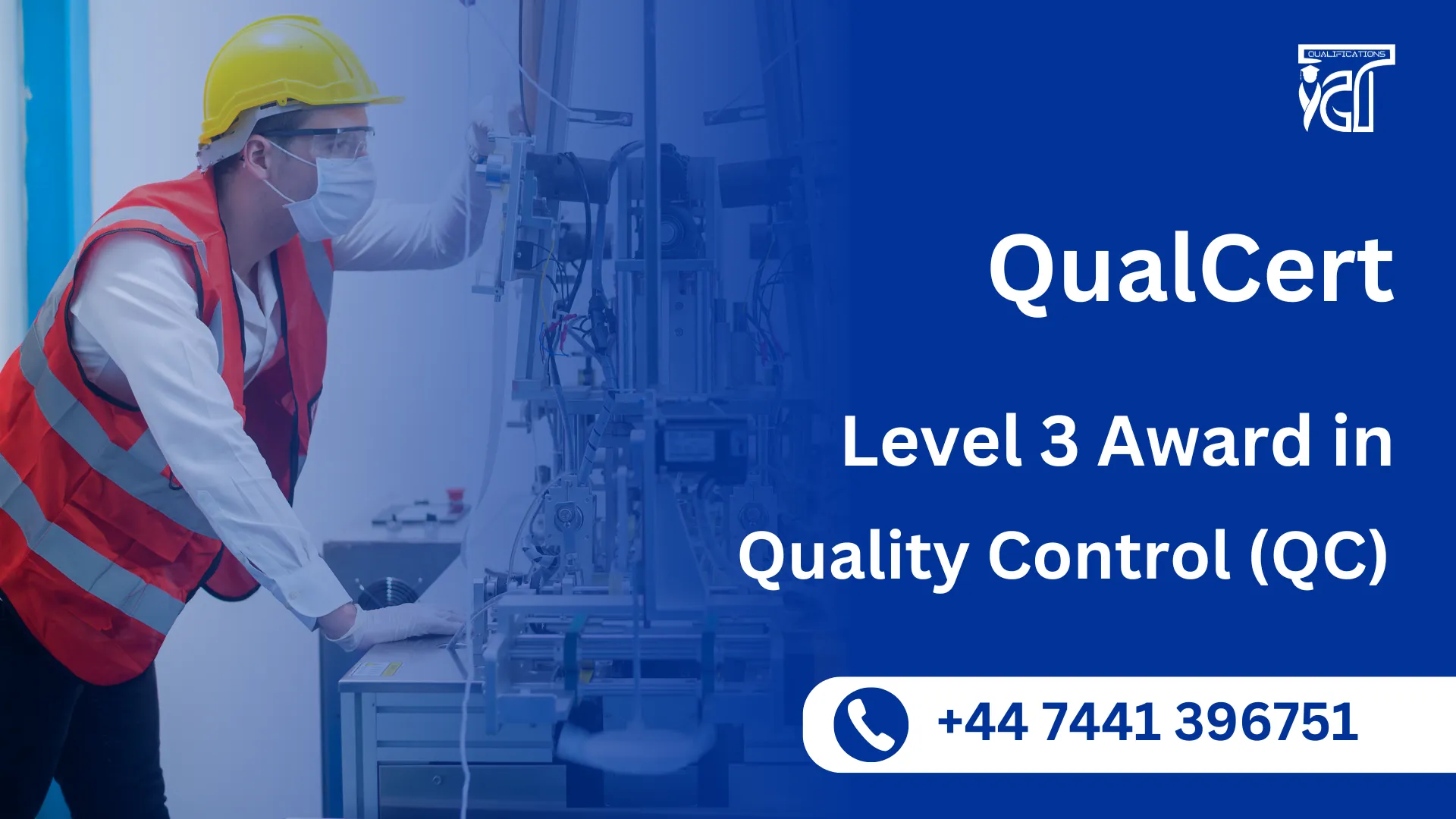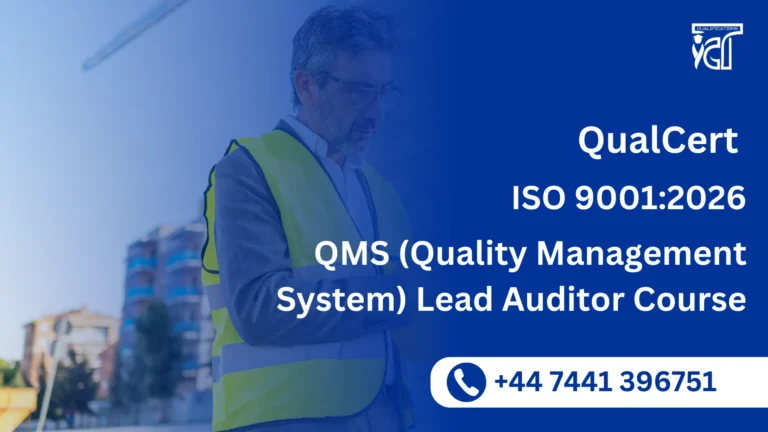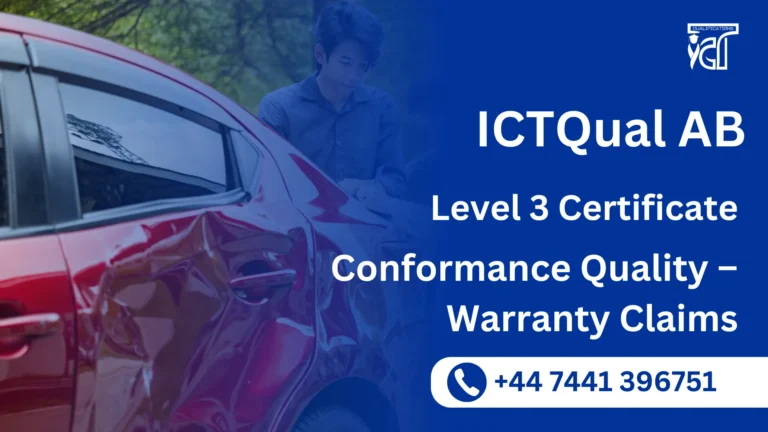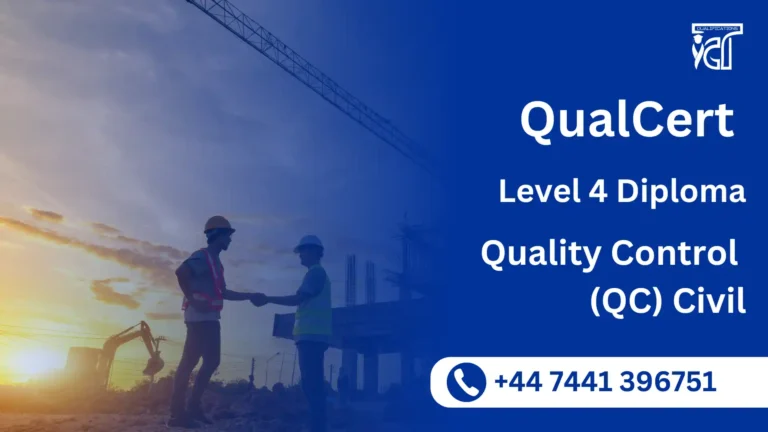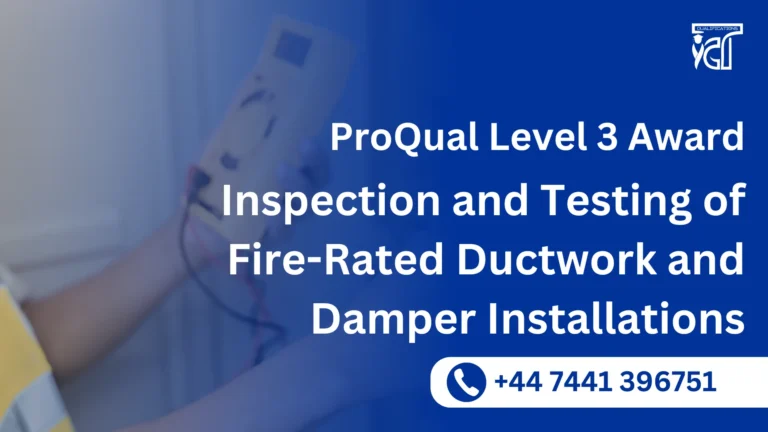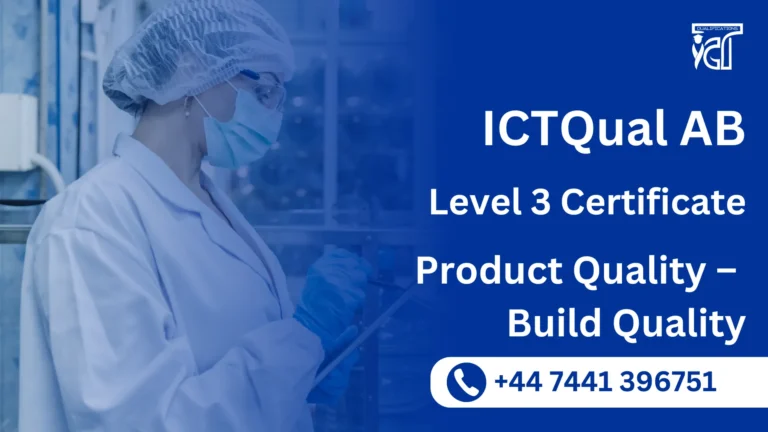As industries across the globe continue to emphasize operational efficiency and compliance, the role of quality control professionals has become more critical than ever. For individuals seeking to enhance their skills in managing quality systems and driving performance improvement, the QualCert Level 3 Award in Quality Control (QC) offers the perfect solution.
This Ofqual-regulated qualification provides a structured, practical approach to learning the intermediate principles of quality control. Designed for professionals with some foundational knowledge or experience in the field, the course delivers industry-relevant competencies that are applicable across manufacturing, logistics, engineering, food production, and beyond.
The QualCert Level 3 Award in Quality Control builds on foundational QC knowledge and introduces learners to more advanced tools and methodologies used in maintaining and improving product and service quality.
This course is fully assignment-based and is delivered via flexible online learning, making it accessible to professionals seeking to balance study with their career or personal commitments.
The course is Ofqual-regulated, making it a trusted credential for employers across the UK and internationally.This qualification strengthens your ability to move into supervisory roles such as Quality Control Supervisor, QA Coordinator, or Compliance Officer.
The QualCert Level 3 Award in Quality Control (QC) is a powerful next step for those looking to develop their expertise in quality assurance and operational excellence. With its practical focus, flexible delivery, and industry-recognized certification, it equips professionals with the tools and confidence needed to lead, improve, and sustain quality across various sectors.
Whether you’re aiming for a promotion, transitioning into quality management, or seeking to expand your professional qualifications, this course delivers real value and real-world skills.
QualCert Level 3 Award in Quality Control (QC)
This QualCert Level 3 Award in Quality Control (QC) course offers 6 Credits, requiring a Total Qualification Time (TQT) of 20 hours, including 16 Guided Learning Hours (GLH). It is designed for efficient and focused skill development in Quality Control (QC).
| Unit Ref# | Unit Title | Credit | GLH | TQT |
| QC01007 – 1 | Advanced Quality Management Systems (QMS) | 1 | 2 | 3 |
| QC01007 – 2 | Advanced Earthworks QC | 1 | 2 | 3 |
| QC01007 – 3 | Documentation and Regulatory Compliance | 1 | 3 | 3 |
| QC01007 – 4 | QC for Green Infrastructure | 1 | 3 | 3 |
| QC01007 – 5 | Testing and Certification Processes | 1 | 3 | 4 |
| QC01007 – 6 | Audit Techniques and Sustainability Strategies | 1 | 3 | 4 |
GLH (Guided Learning Hours) and TQT (Total Qualification Time) are terms commonly used in vocational qualifications to help define the amount of time a learner is expected to spend on their studies.
1. GLH (Guided Learning Hours)
GLH refers to the number of hours a learner spends being directly taught, supervised, or supported during their course. This includes the time spent in activities such as:
- Classroom instruction
- Practical workshops
- One-on-one tutoring or mentoring sessions
- Online learning sessions with tutor support
In other words, GLH represents the time that learners are actively engaged with their instructors or learning activities.
2. TQT (Total Qualification Time)
TQT represents the total amount of time a learner is expected to invest in completing a qualification, including:
- GLH (Guided Learning Hours): Time spent on direct learning, as explained above.
- Self-Directed Learning: This includes time spent on independent study, research, assignment completion, preparation for exams, and any other work the learner does outside of direct teaching hours.
TQT is a broader measure that includes all the time required to achieve the qualification. It helps learners and employers understand the overall commitment required for the qualification.
Key Differences Between GLH and TQT:
- GLH focuses on direct learning with guidance or supervision.
- TQT includes GLH as well as independent study time and other learning-related activities.
Example:
If a qualification has a TQT of 600 hours and a GLH of 250 hours, it means the learner should spend 250 hours in direct learning (classroom, online, or tutor-led sessions) and 350 hours on independent study or research.
Upon completion of the Level 3 Award in Quality Control, participants can expect to achieve the following learning outcomes:
Advanced Quality Management Systems (QMS)
- Understand the principles and components of advanced quality management systems.
- Develop and implement effective quality management strategies in complex environments.
- Apply advanced tools and methodologies to assess and improve quality within an organization.
- Identify the role of leadership in maintaining and enhancing quality standards.
- Analyze the impact of quality management systems on overall business performance.
Advanced Earthworks QC
- Comprehend the key processes involved in quality control for earthworks projects.
- Assess and monitor the quality of materials and processes used in earthworks construction.
- Implement quality control measures to meet environmental and safety standards in earthworks.
- Identify common challenges and develop solutions to ensure the consistency and quality of earthworks operations.
- Understand the role of documentation and reporting in ensuring earthworks quality compliance.
Documentation and Regulatory Compliance
- Understand the importance of documentation in maintaining quality control and regulatory compliance.
- Learn how to create, maintain, and review quality assurance documentation according to industry standards.
- Recognize key regulatory requirements in various sectors and ensure adherence to relevant compliance standards.
- Understand the role of documentation in audits and certification processes.
- Develop strategies to improve the efficiency and effectiveness of documentation management.
QC for Green Infrastructure
- Understand the principles of quality control specific to green infrastructure projects.
- Implement QC practices in the design, construction, and maintenance of sustainable green infrastructure.
- Identify materials and techniques that align with environmental sustainability standards.
- Evaluate the impact of green infrastructure on the environment and ensure compliance with regulatory requirements.
- Monitor and improve the performance of green infrastructure systems through ongoing quality control.
Testing and Certification Processes
- Gain knowledge of various testing and certification processes used to verify product quality.
- Develop and implement testing procedures to assess the quality of materials, products, and systems.
- Understand the role of testing in meeting industry standards and regulatory requirements.
- Interpret test results accurately and make data-driven decisions to ensure product quality.
- Ensure compliance with certification processes and prepare products for certification audits.
Audit Techniques and Sustainability Strategies
- Understand the principles and techniques used in conducting effective quality audits.
- Learn how to plan, execute, and report on audits to ensure compliance with quality standards.
- Identify areas for improvement within an organization’s quality systems through audit findings.
- Develop sustainability strategies to integrate environmental considerations into quality management processes.
- Promote continuous improvement by applying audit results to enhance sustainability and long-term performance.
Benefits of the QualCert Level 3 Award in Quality Control (QC)
1. Ofqual-Regulated and Globally Recognized
This qualification is officially regulated by Ofqual (UK), giving it credibility and recognition both nationally and internationally. Employers across various industries value this certification as a mark of competence in quality control.
2. Advances Your Career in Quality Assurance
The Level 3 Award is ideal for those aiming to progress into supervisory or specialist roles in quality control, such as:
- Quality Control Supervisor
- QA Technician
- Inspection Team Leader
- Compliance Assistant
It gives you the edge needed for promotion or career change.
3. Develops Intermediate-Level QC Skills
You’ll build on basic QC knowledge and learn more advanced techniques, including:
- Data analysis and interpretation
- Statistical quality control (SQC)
- Defect reduction methods
- Internal reporting and documentation best practices
These skills are directly applicable in the workplace.
4. 100% Assignment-Based – No Exams
This qualification is entirely coursework-focused, making it accessible to learners who prefer practical application and real-world scenarios over traditional examinations.
5. Delivered Online for Flexible Learning
Study at your own pace, from anywhere in the world. The course is ideal for:
- Working professionals
- Shift-based employees
- International students
- Career changers
6. Increases Employability Across Multiple Sectors
Quality control is critical in many industries, including:
- Manufacturing
- Engineering
- Food Safety
- Pharmaceuticals
- Logistics & Distribution
This qualification enhances your chances of securing quality roles in diverse sectors.
7. Enhances Confidence in Compliance and Auditing
Gain the ability to contribute to internal audits, support regulatory compliance, and participate in continuous improvement processes, helping your organization meet industry and legal standards.
8. Strong Foundation for Further Study
The Level 3 Award opens pathways to higher-level qualifications, such as:
- QualCert Level 4 Certificate or Diploma in Quality Management
- ISO 9001 Internal or Lead Auditor Training
- Advanced diplomas in Risk, Compliance, or Operational Excellence
9. Boosts Your Value to Employers
Professionals with quality control certifications are seen as asset builders in their organizations—reducing error rates, maintaining compliance, and improving productivity.
10. Supports Career Longevity
Quality assurance is a recession-resilient career field, with growing demand across sectors. Gaining a recognized Level 3 Award helps ensure job security and long-term career growth.
The Level 3 Award in Quality Control is designed for a diverse audience, including:
- Aspiring Quality Control Managers: Individuals aiming for leadership roles in quality control and quality assurance.
- Quality Control Professionals: Experienced quality control professionals seeking to deepen their expertise.
- Quality Assurance Specialists: Quality assurance experts looking to complement their skills with advanced quality control knowledge.
- Industry-Specific Experts: Professionals working in complex and highly regulated industries.
- Continuous Improvement Enthusiasts: Those passionate about driving continuous quality improvement.
- Engineers and Scientists: Graduates and professionals from engineering and science backgrounds.
Entry Requirements
Register Now
Qualification Process
Qualification Process for the QualCert Level 3 Award in Quality Control (QC)
- Self-Assessment:
Begin by evaluating your eligibility to ensure you meet the qualification requirements, including work experience, knowledge, and language proficiency. - Registration:
Complete your registration by submitting the required documents, including a scanned copy of a valid ID, and paying the registration fee. - Induction:
An assessor will conduct an induction to confirm your eligibility for the course and explain the evidence requirements. If you do not meet the criteria, your registration will be canceled, and the fee will be refunded. - Assignmnets & Evidence Submission:
Provide all assignmnets and the necessary evidence based on the assessment criteria outlined in the course. If you are unsure of the required evidence, consult with the assessor for guidance on the type and nature of evidence needed. - Feedback and Revision:
The assessor will review your submitted evidence and provide feedback. Evidence that meets the criteria will be marked as “Criteria Met,” while any gaps will be identified. You will be asked to revise and resubmit if needed. - Competence Evidence:
Submit final evidence demonstrating that all learning outcomes have been met. This evidence will be marked as “Criteria Met” by the assessor once it is satisfactory. - Internal Quality Assurance (IQA):
The Internal Quality Assurance Verifier (IQA) will review your evidence to ensure consistency, quality, and compliance with standards. - External Verification:
The IQA will submit your portfolio to QualCert External Quality Assurance Verifiers (EQA) for final confirmation. The EQA may contact you directly to verify the authenticity of your evidence. - Certification:
Upon successful completion of all checks, QualCert will issue your official certificate, confirming that you have attained the QualCert Level 3 Award in Quality Control (QC).

